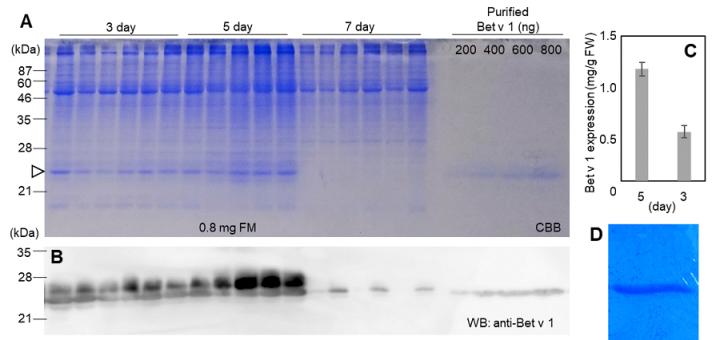Researchers from the University of Tsukuba develop a novel high-yield method for the efficient production of birch pollen allergen for immunotherapeutic purposes

Credit: University of Tsukuba
Tsukuba, Japan – Allergies can significantly affect health and quality of life. While allergen immunotherapy provides long-lasting therapeutic relief to people suffering from environmental allergies, the therapy can last several years and requires large amounts of allergen. Now, researchers from the University of Tsukuba developed a novel system that enables the mass production of the major birch pollen allergen Bet v 1 in plant leaves in just a matter of days. In a new study published in Frontiers in Plant Science, they showed that their system not only produces large amounts of Bet v 1, but the purified protein was also highly reactive towards the IgE antibodies in sera from individuals with birch pollen allergy.
“The idea of allergen immunotherapy is to desensitize the body’s response to the allergen by exposing patients to it in gradually increasing amounts,” says corresponding author of the study Professor Kenji Miura. “Because a significant drawback is the difficult, expensive and low-yield production of allergens, our goal was to develop a new system that allows for the rapid and massive production of allergens that can be used in the clinical setting.”
To achieve their goal, the researchers turned to their previously established “Tsukuba system,” which makes use of a method called agroinfiltration. They first introduced the gene for Bet v 1 into a specific type of bacteria called Agrobacterium tumefaciens and let them grow. They then immersed leaves of the plant Nicotiana benthamiana into the bacterial solution to bring the bacteria into close contact with the plant, so the bacteria could transfer the Bet v 1 gene to plant cells, which in turn started producing the protein. To test the quality of their product, the researchers also produced the protein in Brevibacillus brevis, which is a standard bacterial host for protein production.
“We were able to purify 1.2mg of Bet v 1 protein from 1g leaves in just 5 days,” explains Professor Miura. “This is a relatively large amount that is otherwise difficult to achieve using standard methods. Our next goal was to test whether our protein was immunogenic, which is a prerequisite for immunotherapy.”
The researchers isolated sera from individuals with birch pollen allergy and mixed them with Bet v 1 protein purified from plants and bacteria. In both cases, the researchers were able to show that Bet v 1-specific IgE from the patients’ sera, which is the antibody causing the allergy, was strongly reactive to their proteins.
“These are striking results that show how functional allergens can be produced in a fast and efficient way,” says Professor Miura. “Given that immunotherapy requires 5-20μg allergen per treatment over several years, our findings could offer an opportunity to significantly improve allergen immunotherapy.”
###
Media Contact
Naoko Yamashina
[email protected]
Related Journal Article
http://dx.




